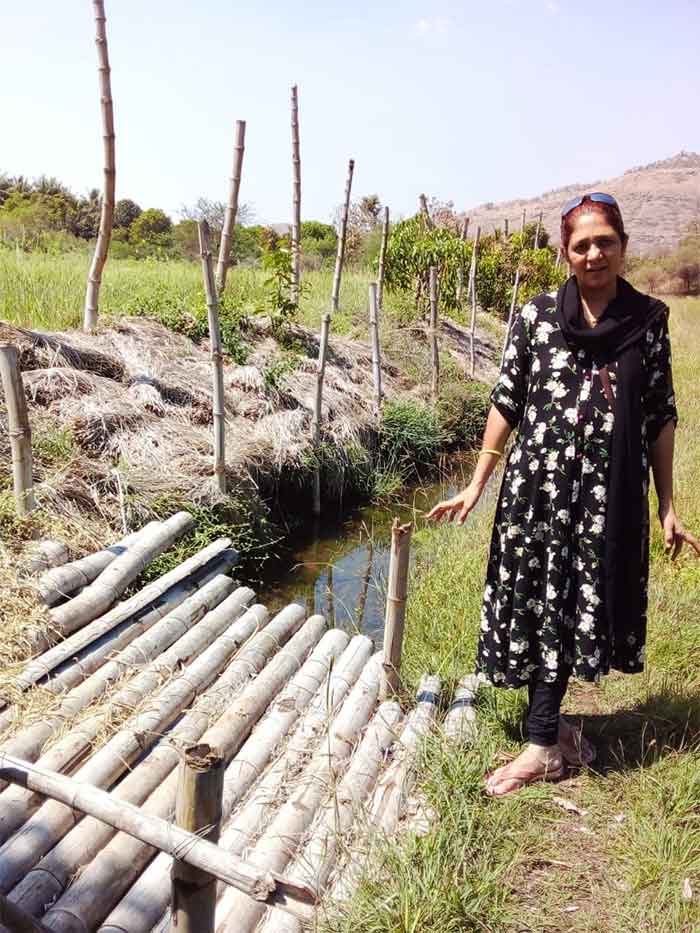
Afrin Kale is a farmer with a degree in civil engineering. A resident of Pune city, her five-acre farm is in Pimpalgaon Ghode village of Ambegaon Tehsil of Pune district, about 80 km from the city. She travels once or twice each week to the farm, and she has hired Ravi and Roshni, a young couple, to live in the farm and help with work.
What is unique about Afrin’s farm is the fact that she uses no chemical fertilizers or pesticides; she also tends to a vast diversity of species. There are four different varieties of wheat, two different varieties of little millets, different kinds of rice, besides radish, corn, mangoes, bananas, mustard, flaxseed, jute, bamboo stalks, zucchini, melons, methi, French beans and other crops.
There is a large 65-metre by 20-metre tank in which fish is being cultivated, and this would be the first lot of rohu (Indian carp) and catla (South Asian carp) fish from her farm. There is one cow, five goats and a few chickens too.
Afrin now works in partnership with 15 different farmers in the area, all of whom grow their crops without using chemical inputs. They meet to decide on what they will grow, so that they can together meet the diverse demands of a regular set of customers, most of whom are residents of Pune keen on cooking with vegetables that are grown in a healthy way, without using poisonous inputs. “Yes, the vegetables are priced a little higher than what one might get in the closest retail market, but we are slowly growing our base of customers,” she says.
The khapli wheat on her farm is nearly ready for harvest. The golden long grains look beautiful, the stalks sway in the wind. As you walk past, you can hear the buzz of bees.
Afrin is also growing Lakhi or khesari dal, which was banned in 1961 as scientists feared it caused lathyrism, a condition marked by numbness in the limbs and spine. In 2016, however, the government heeded the persistent campaign of Shantilal Kothari, a nutrition expert, who asserted that the dal had nothing to do with the disease, and was actually a healthy option for many rural families that earlier grew it. The ban has now been lifted, and the dal can be cultivated again. “It was always renowned as a super-food among tribal communities. The fear that neurological problems were caused because of it was unfounded,” says Afrin.
Although her husband’s family owns land near this plot, Afrin has been cultivating her five-acre field on her own for a few years. “I wanted to be free to do things my own way, after having learned the ropes. This farm gives me that freedom, and I’ve also managed to form a little community of people who grow grains, legumes and vegetables without using fertilizers and pesticides,” she says.
Getting the crops to urban consumers was a challenge. “However, we now have this group of 15 farmers who together collect the produce and market it – that makes for shared expenses and our community of consumers is growing too.” Afrin also gathers up dry leaves from her neighbourhood in Baner to take to her farm. “It would be nice, though, if that waste recycling process was also rewarding financially – right now, I pay for transport and am not paid for clearing the leaves,” she says.
What is special about this farming initiative is that people who buy the produce are also free to visit the farm and see how work occurs there.
“When I first bought this land about 15 years ago, it was very marshy. This canal flows through it, and I managed to divert it and informally exchange a small part with my neighbor so that the canal now forms a natural boundary between us. This land is spread over the Sahayadri Hills, so we cultivate in small terrace farms; to hold the soil on each step, I have grown khas grass and I am also using dry stalks of wheat and paddy to create the biomass that will enhance the soil.”
Afrin used some bit of her training as an engineer to decide on where the well would be dug, at a point lower than much of the surrounding fields; she also found one patch of her field always wet, and decided that she would have a tank there and rear fish.
“I did not get farming as a natural inheritance – I learned from scratch, and my father-in-law’s elder brother was a great teacher. I owe much that I have learned to him. Everything he did was organic, and we never ever had to buy chemicals to feed the soil. I work for the health of the planet and of the people who eat what I grow. That, I think, is what being a farmer is about.”
Rosamma Thomas is an independent journalist
GET COUNTERCURRENTS DAILY NEWSLETTER STRAIGHT TO YOUR INBOX














































